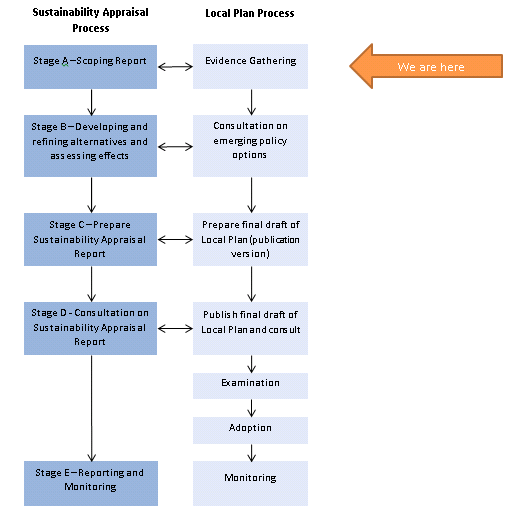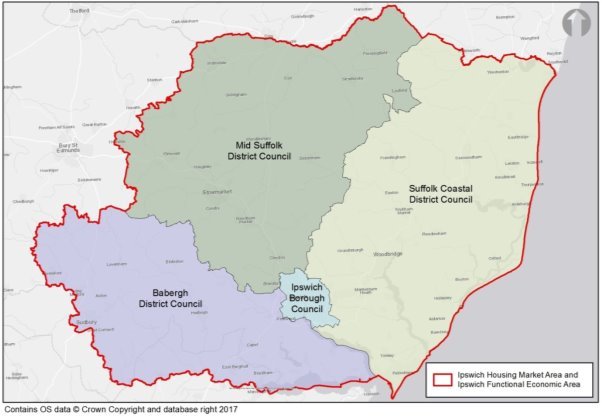Sustainability Appraisal Scoping Report
Chapter 1 - Introduction
Ipswich Local Plan Review
1.1 The Local Plan Review will help to shape the future growth and development of the district and the economic, social and environmental relationships between the Ipswich Housing Market Area authorities.
The Local Plan Review will replace the existing 2017 Ipswich Local Plan Documents, namely;
- Core Strategy and Policies DPD Review (adopted February 2017)
- Site Allocations and Policies (incorporating IP-One Area Action Plan) DPD (adopted February 2017)
|
Ipswich Borough Council Local Plan Review- Key Facts |
|
|
Name of Responsible Authority |
Ipswich Borough Council |
|
Title of programme |
Ipswich Borough Council Local Plan |
|
What prompted the plan |
The Council adopted its Local Plan in February 2017 for the period 2011 to 2031. The Inspector's report on the examination of that plan concluded it is now necessary to produce joint or aligned Local Plans with Babergh, Mid Suffolk and Suffolk Coastal District Councils to consider in particular housing or employment development within the Ipswich Housing Market Area and Ipswich Functional Economic Area. |
|
Subject |
Spatial development planning |
|
Period covered |
2016 to 2036 |
|
Frequency of updates |
As needed in order to keep the plan up-to-date. |
|
Area covered |
The administrative area of Ipswich Borough Council as part of the wider Ipswich Housing Market Area and F.E.A. |
|
Purpose and scope of the plan |
To succeed the adopted Ipswich Local Plan (2017) in being the adopted development plan for the Borough to 2036. To address strategic and local planning matters in the context of the Borough and the wider Ipswich Housing Market Area and Functional Economic Area. In line with the National Planning Policy Framework, to meet the objectively assessed housing needs of the housing market area in full, in alignment with Babergh, Mid Suffolk and Suffolk Coastal Districts which also form the housing market area. |
|
Contact point |
Planning Policy Team Planning and Development, Ipswich Borough Council, Grafton House 15-17 Russell Road, Ipswich, IP1 2DE Tel: 01473 432019 |
Purpose of this Document
1.2 A Sustainability Appraisal (SA) is a systematic process by which the Local Plan is assessed to see how well it meets the economic, social and environmental needs of its current and future population. Sustainable development is defined "development that meets the needs of the present without compromising the ability of future generations to meet their own needs[4]."
1.3 The SA evaluates alternative spatial development proposals and scenarios and considers their relative merits against each other in order to take forward the most appropriate policies in the Local Plan. It also examines the consequences of not developing a new Local Plan. This SA will be specific to Ipswich Borough, taking into account Ipswich's position within the wider Ipswich Housing Market Area and Functional Economic Area (see figure 1 below).
Figure 1: Ipswich Housing Market Area
1.4 The Scoping Report has been prepared as part of the combined Strategic Environmental Assessment (SEA) and Sustainability Appraisal (SA). The SA process is at the heart of the plan-making process and is mandatory for all local planning authorities to undertake as part of the preparation of a Development Plan as stipulated under the Planning and Compulsory Purchase Act 2004. This Act also stipulates that the SA must comply with the requirements of the Strategic Environmental Assessment (SEA) in accordance with European Directive 2001/42/EC on the assessment of the effects of certain plans and programmes. The objective of SEA as defined in the Government's guidance on SEA is:
"To provide for a high level of protection of the environment and contribute to the integration of environmental considerations into the preparation and adoption of plans and programmes with a view to promoting sustainable development".
1.5 SEA focusses on the environmental elements of the plan, whilst the SA process is broader covering the social, economic and environmental impacts of the plan. Government guidance suggests that SA and SEA requirements can be met through a single appraisal process. SA, in essence, is about asking at regular intervals during the plan preparation "how sustainable is the plan?" By asking this question frequently alongside policy development, a judgement can be made as to the extent of sustainable development for which each approach provides. It may support the initial approach or encouraging rethinking of proposals. It is important that a Sustainability Appraisal be carried out alongside the Local Plan so as to provide an up to date discussion on the Local Plan, the process of which can be seen in figure 2.

We are here:
Figure 2: Local Plan and Sustainability Appraisal Process
Stage A – The Scoping Report
1.6 The first part of a sustainability appraisal is the scoping report. The Scoping Report:
- Details the existing baseline in respect of key sustainability issues;
- Reviews other relevant programmes, plans and strategies that have an influence on sustainability;
- Identifies key sustainability issues that need to be addressed; and
- Sets out a Sustainability Appraisal Framework for assessing policy options and the overall effect of the plan.
1.7 Baseline information refers to the existing economic, social, and environmental characteristics of an area that may be affected by the local plan. It allows the planning authority to develop a set of objectives, based on the data gathered, to inform the sustainability appraisal and therefore, plan preparation.
1.8 The Scoping Report is the first stage in the process of SEA and SA and the Council will follow the stages below whilst undertaking these considerations to ensure that statutory requirements are met as a Local Plan Review is developed:
|
Stage A: Setting the context and establishing the baseline |
Output: Scoping Report |
|
Stage B: Developing and refining alternatives and assessing effects |
Output: Sustainability Appraisal Report |
|
Stage C: Preparing the Sustainability Appraisal Report |
Output: Sustainability Appraisal Report |
|
Stage D: Consulting and decision making |
Output: Sustainability Appraisal Statement |
|
Stage E: Monitoring implementation of the plan |
Output: Included in Annual Progress Report on Plan implementation |
1.9 Stage A contains five steps which constitute the process for producing a Scoping Report, as explained below;
- Stage A1 – identifying other relevant plans, programmes and environmental protections' objectives (Chapter 2 of this report). Policies within the Local Plan Review will be influenced by other relevant international and national legislation. Therefore the Scoping Report lists relevant legislation and policies and their key objectives and details how future Local Planning policies take these objectives into account during the preparation.
- Stage A2 – baseline information detailing a range of social, economic and environmental data is obtained from a number of sources (Chapters 3,4,5 and 6 of this report). Collectively this date will be used as the baseline to provide the basis for identifying issues and determining objectives for the Local Plan Review.
- Stage A3 – the baseline information provides the evidence base from which the local authority is able to identify sustainability issues (Chapter 7).
- Stage A4 – Developing SA objectives and testing their compatibility which will be used to appraise the policy options as the Local Plan Review progresses. The SA objectives provide the opportunity to compare the potential effects of all reasonable options considered (Chapter 8).
- Stage A5 – Consultation on every element of the SA is fundamental and required by national regulations. The Scoping Report will be informed through consultation with statutory bodies and other relevant stakeholders across the district and the wider plan area (Chapter 9).
1.10 The Scoping Report and future iterations of the SA to accompany the Local Plan Review will help the Council to produce a sustainable plan and meet its legislative requirements and responsibilities.
Habitats Regulation Assessment
1.11 European Directive 92/43/EEC on the Conservation of Natural Habitats and of Wild Fauna and Flora (the Habitats Directive) requires Habitats Regulations Assessment (HRA) to be undertaken on the Local Plan. In the UK, the Habitats Directive is implemented through the Conservation of Habitats and Species Regulations 2010 (the 'Habitats Regulations')
1.12 A separate HRA screening exercise for the Local Plan
will be undertaken. The results will be used to inform
subsequent SA reports, in particular with regard to
biodiversity and habitats.
[4] World Commission on Environment and Development (1987). Our Common Future. Oxford: Oxford University Press

